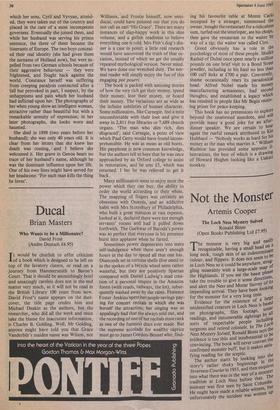Ducal
Brian Masters
Who Wants to be a Millionaire? David Frost (Andre Deutsch £4.95)
It would be churlish to offer criticism of a book which is designed to be left on top of the lavatory cistern, or read on a journey from Hammersmith to Baron's Court. That it should be astonishingly brief and amazingly careless does not in the end matter very much, as it will not be read in the British Library 100 years from now. David Frost's name appears on the dust- cover, the title page credits him and Michael Deakin as the authors, but the researcher, who did all the work and must take the blame for inaccurate information, is Charles B. Golding. Well, Mr Golding, anyone might have told you that Grace Vanderbilt's maiden name was Wilson, not
Williams, and Frostic himself, now semi- ducal, could have pointed out that you do not call an earl 'His Grace'. There are many instances of slap-happy work in this slim volume, and a girlish readiness to believe
everything one is told. Mrs Fish's dog's din- ner is a case in point; a little real research would have uncovered the truth of that oc- casion, instead of which we get the usually repeated mythological version. Never mind. We have done our wretched duty. The nor- mal reader will simply enjoy the fun of this engaging pot pourri.
The book is packed with amusing stories of how the very rich get their money, spend their money, lose their money, or hoard their money. The variations are as wide as the infinite subtleties of human character. Some millionaires, like Carnegie, feel a mite uncomfortable with their loot and give it away in 2,811 free libraries or 7,689 church organs. 'The man who dies rich, dies disgraced', said Carnegie, a point of view which Paul Getty would have found incom- prehensible. He was as mean as old boots. His payphone is now common knowledge, but the authors tell us here that he was once approached by an Oxford college to assist in restoration, and he sent £5, which was returned. I bet he was relieved to get it back.
Many millionaires seem to enjoy most the power which they can buy, the ability to order the world according to their whim. The snapping of fingers was certainly an obsession with Onassis, and an addictive habit with Mrs Stotesbury of Philadelphia, who built a great mansion at vast expense, looked at it, declared there were not enough servants' rooms and had it pulled down forthwith. The Gaekwar of Baroda's power was so perfect that everyone in his presence burst into applause when he farted.
Sometimes power degenerates into mere self-indulgence when there aren't enough hours in the day to spend all that one has. Diamonds set in tortoise shells (live ones) or in the spokes of a bicycle wheel seem rather wasteful, but they are positively Spartan compared with Daniel Ludwig's mad crea- tion of a personal empire in the Amazon forest (with roads, railways, the lot), subse- quently washed away by the rains. Florence Foster Jenkins Ispent her I ampleisavings pay- ing for concert recitals in which she was herself the attraction; her singing was so appalingly bad that she always sold out, and the recording of one of her recitals must rank as one of the funniest discs ever made. But the supreme accolade for wealthy caprice must go to James Gordon-Bennet who, find- ing his favourite table at Monte Carla occupied by a stranger, summoned the owner, bought the restaurant for a ridiculous sum, turfed out the interloper, ate his chops, then gave the restaurant to the waiter by way of a tip; the waiter was called Ciro.
Greed obviously has a role in the psychology of most of these people. Sheikh Rashid of Dubai once spent nearly a million pounds on one brief visit to a Bond Street jeweller, including in his haul no less than 100 cuff links at £700 a pair. Conversely, shame occasionally rears its paradoxical head. Alfred Nobel made his money manufacturing armaments, had second thoughts, and established a legacy which has resulted in people like Mr Begin receiv- ing prizes for peace-keeping. This book has no pretensions to explore beyond the unattested anecdote, and will provide many a good joke for an after- dinner speaker. We are certain to he again the rueful remark attributed to 1(1.0 Hubbard — 'Nobody works as hard for his money as the man who marries it.' William Rushton has provided some apposite il- lustrations, the best of which is a drawing. of Howard Hughes looking like a Uakari monkey.














































 Previous page
Previous page